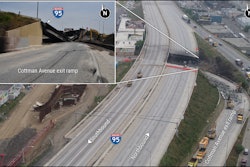After a full on showdown at the state capitol in Little Rock, the Arkansas state legislature has passed a bill that would impose up to $1,000 fines on commercial vehicle (CMV) drivers in the state who can't readily speak and read English, as well as making it a Class D felony for foreign drivers to operate a CMV without proper documentation or with false credentials.
The bill passed on Wednesday with a vote of 82 Yeas, 18 non votes, and not a single vote against it. The bill now awaits Arkansas Governor Sarah Huckabee Sanders' signature to become law.
The bill, HB 1745, had backing from the Arkansas Trucking Association, and was also supported by the Owner-Operator Independent Drivers Association, and comes as the Federal Motor Carrier Safety Administration's newly minted leadership acknowledges having serious conversations about drivers who can't speak English, foreign drivers, and nondomiciled CDLs, which are CDLs states issue to non-permanent residents.
[Related: State bill would criminalize non-citizen truck drivers]
In a 2016 memo, FMCSA relaxed guidance around 49 CFR 391.11(b)(2), a regulation that requires CMV drivers to "read and speak the English language sufficiently to converse with the general public, to understand highway traffic signs and signals in the English language, to respond to official inquiries, and to make entries on reports and records" after the Commercial Vehicle Safety Alliance removed it as an out-of-service violation.

Since then, a number of crashes, sometimes deadly, where drivers appeared unable to speak English or read road signs, have moved some to advocate making a lack of English an OOS violation yet again. OOIDA petitioned the Commercial Vehicle Safety Alliance in March to do exactly that, saying that since the "2019 FMCSA guidance which allows non-domiciled CDLs, an alarming amount of unsafe incidents have been observed by our members. Many of these non-domiciled drivers have had issues understanding basic signs or instructions at truck stops, warehouses and fueling stations."
Asked about the petition, a CVSA representative said that it's "important to note that enforcement of the English Language Proficiency requirement in 391.11(b)(2) has not stopped," just that it's no longer an OOS violation and it "remains a violation that is documented when appropriate."
CVSA said it would consider OOIDA's petition in a late-April meeting and then it could be sent to its 70 North American voting members and potentially approved in the fall.
Arkansas, contrary to popular social media myth, has not been enforcing English proficiency with traffic stops or arrests, both Arkansas State Police and Arkansas Highway Police confirmed to Overdrive in March. If the governor signs HB 1745, enforcing the English requirement "will be an option for troopers," according to Major Ron Casey, the Highway Patrol Commander of the Arkansas State Police.
Shannon Everett, among founders of a group called American Truckers, testified to the Arkansas legislature against HB 1745, saying that the bill codifies into state law that foreign drivers on work visas can haul in the state, and that fines for English proficiency violations without impoundment are "toothless."
Federal law already permits foreign drivers on work visas, and ATA has previously countered that the bill needed to define those concepts to allow law enforcement to police them.
OOIDA expressed support for the bill but said it is "working on the federal level and the state level to close the non-domiciled CDL loophole and to make language proficiency an out-of-service violation once again."
OOIDA testified before Congress to that effect in late March.
[Related: Arkansas police testing drivers' English skills at roadside? Social media says yes, but ...]
What's exactly in Arkansas HB 1745?
Arkansas HB 1745 starts with a definition of "Employee Authorization Document" or "work permit" and then a definition of "public record" before making amendments to Arkansas law that would make it a felony to knowingly make, present, or use a fake foreign CDL.
The bill goes on to create the offense of "operating a commercial motor vehicle without proper documentation," which applies if drivers knowingly have a valid foreign CDL and no valid work visa or employment authorization document in their "immediate possession." That offense is a felony, but it's downgraded to a misdemeanor if "the person establishes by a preponderance of the evidence that at the time the offense was committed, he or she had been issued a valid Employment Authorization Document or a valid work visa."
Next, it creates the offense of operating a commercial motor vehicle without sufficient English Language proficiency, saying commercial vehicle operators must be able to:
- Converse with the general public;
- Understand highway traffic signs and signals in the English language;
- Respond to official inquiries; and
- Make entries on reports and records.
CMV operators who fail to "demonstrate proficiency in the English language are subject to a violation and a fine of up to $500 for the first offense and $1,000 for the second or subsequent offense.
Finally, the bill amends Arkansas Code § 27-23-123 to say that drivers with CDLs issued by "Canada, Mexico, or any other jurisdiction under a waiver or exemption recognized by the Federal Motor Carrier Safety Administration" need a valid commercial license as well as a "valid work visa or valid Employment Authorization Document" that is not "suspended, revoked, cancelled," or the driver disqualified or subject to an OOS order.









